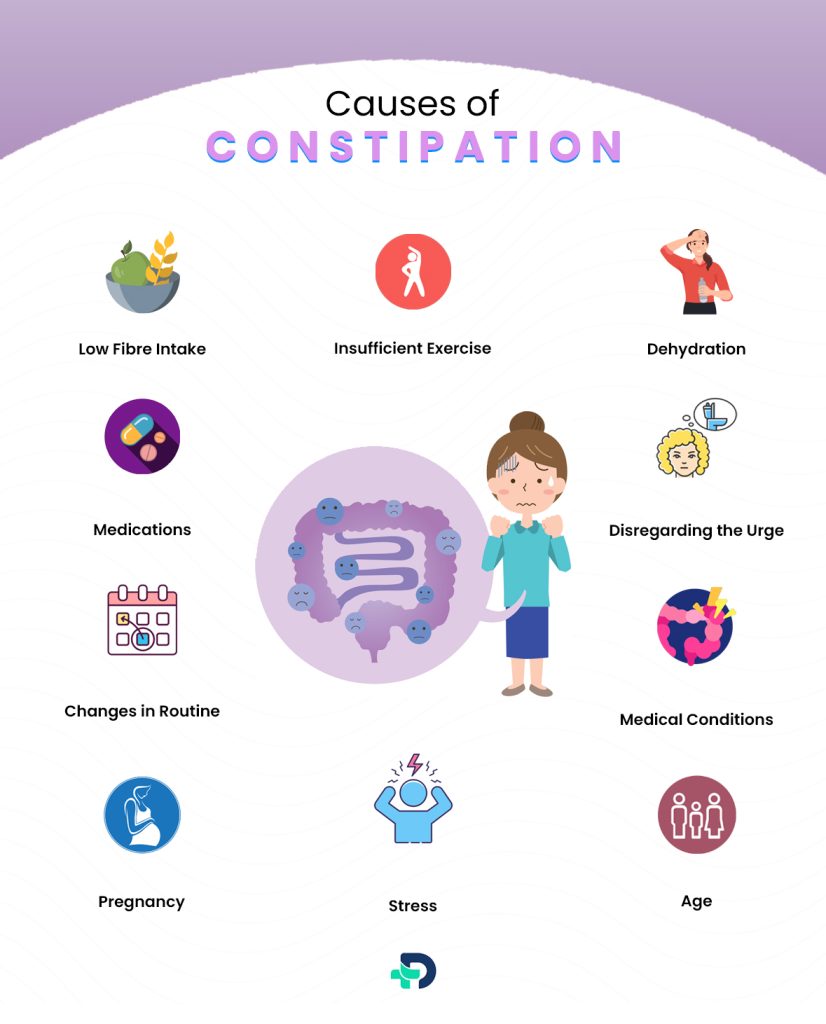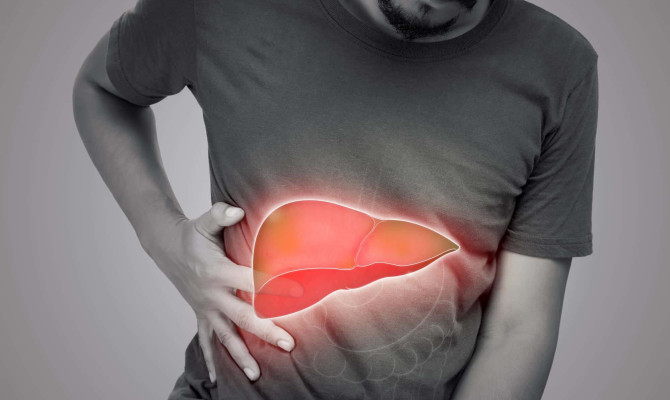Can Constipation Cause Fever

- Constipation
- 28 Sep 2023
Introduction
Constipation & Fever
Our health is orchestrated by a careful balance between many systems in the complex topography of the human body.
Among them, the stomach frequently commands attention as a hub of activity that affects factors other than digestion.
It’s a world where our health is determined by the mysterious dance of bacteria and the balance of processes.

Can a condition like constipation, which at first glance seems harmless, trigger a chain of events that end with an unanticipated spike in body temperature?
- Constipation 1Definition | Researched based study from National Institutes of Health is more than just having trouble passing stool; it’s sometimes written off as a minor discomfort.
- Recent medical studies have suggested an intriguing link between constipation and a seemingly unrelated condition: fever.
- Although it might seem strange, this pair of apparent strangers might be more than just passing acquaintances.
Could the slowness of the intestines and the body’s inflammatory reaction be intricately intertwined, causing a rise in temperature?
- In order to clarify the hidden connections that science is just now starting to find, this investigation dives into the mechanisms that connect constipation and fever.
Join us as we explore the links that may exist, revealing that even seemingly routine body processes may conceal astounding truths.
Constipation
What is Constipation?
- Constipation is a typical issue that develops when someone finds it difficult to pass stools or when they don’t visit the restroom as frequently as they usually do.
- Your body absorbs the nutrients it requires from food, while the remainder decompose into waste. Your body eliminates this waste when you use the restroom.
- It’s possible for trash to become harsh and dry when it passes through your digestive system too slowly.
- It is more difficult for the waste to leave your body when it is dry. When you try to use the restroom as a result, you can experience pain and discomfort.
- Constipation can happen for many different reasons. Constipation can result from a lack of water intake, a diet low in fibre (found in fruits, veggies, and whole grains), and a lack of physical activity.
- Constipation can occasionally be made more probable by specific drugs or medical conditions.
Keep in mind that every person has a unique body, so what works for one person may not necessarily work the same way for another. However, generally speaking, it’s best to drink plenty of water, eat healthily, and exercise to keep your digestive system functioning properly and avoid constipation.
Causes

Causes of Constipation
There are a number of causes 1Causes | Researched based study from National Institutes of Health for this constipation, including:
Low Fibre Intake:
- Dietary fibre helps keep faeces soft and easy to pass. Fibre gives stools bulk, which makes it easier for them to pass through the intestines.
Dehydration:
- Drinking insufficient amounts of water might result in dry, firm stool that is difficult to pass.
- For the purpose of maintaining regular bowel motions, enough hydration is crucial.
Insufficient Exercise:
- By encouraging the natural contractions of the intestines, regular physical exercise aids in the stimulation of bowel motions.
- Living a sedentary lifestyle might cause constipation.
Disregarding the Urge:
- Ignoring the body’s cues to urinate might result in stool lingering in the colon for a longer period of time, which causes higher water absorption and tougher stool.
Medications:
- A number of drugs, including some antidepressants, antacids with calcium or aluminum, and opioids, can cause a slowed-down bowel movement.
Medical Conditions:
- Irritable bowel syndrome (IBS), thyroid issues, and diabetes are a few conditions that might impair regular bowel movements and result in constipation.
Changes in Routine:
- The body’s normal bowel cycles might be impacted by travel, altered daily routines, or irregular mealtimes.
Stress:
- High amounts of anxiety or stress can affect how well the digestive system works and cause constipation.
Pregnancy:
- It can result from hormonal changes and pressure on the intestines that occur during pregnancy.
Age:
- Slower bowel motions can occur in elderly people due to decreased muscle tone in the intestines.
Consulting a healthcare provider is advised if constipation persists or worsens in order to determine any underlying causes and receive the right therapy.
Symptoms
Symptoms of Constipation
Typical signs of constipation 1Symptoms | Researched based study from National Institutes of Health include:
Infrequent Bowel Movements:
- You might discover that you have fewer restroom visits than normal. Less than three bowel motions per week could be a warning indicator.
Hard Stools:
- When your stool gets dry and firm, it might be difficult to pass, which can be uncomfortable and straining.
Straining:
- Constipation may be indicated if you are straining to pass stools.
- This can significantly reduce how joyful using the restroom is .
Fullness in Abdomen:
- Even after using the restroom, you could feel the need to use the restroom again.
- It seems like your body isn’t emptying completely.
Abdominal Discomfort:
- Constipation can cause cramps and other types of general abdominal discomfort.
- This soreness can be hardly perceptible or quite strong.
Bloating:
- Gas and stool that has been trapped in the intestines might cause a bloating and fullness sensation.
Loss of Appetite:
- If something is wrong with your digestive system, you might not feel as hungry as usual.
Hard to Pass Stool:
- It may hurt or take a lot of effort to pass a stool. This may make you feel uncomfortable and frustrated.
Keep in mind that experiencing periodic constipation is normal and typically not cause for alarm.
However, it’s wise to seek the counsel and proper care of a healthcare provider if your symptoms are severe or persistent.
What are the Symptoms of Severe Constipation?
- Severe constipation can manifest with symptoms such as infrequent bowel movements, difficulty passing stools, abdominal pain, bloating, and a feeling of incomplete evacuation.
- This condition might lead to discomfort, straining during bowel movements, and even rectal bleeding in some cases.
- Lifestyle factors, lack of dietary fiber, dehydration, certain medications, and underlying medical conditions can contribute to its severity.
- Seeking medical attention is advisable if these symptoms persist, as severe constipation could indicate an underlying issue that needs to be addressed.
Relation
Relation Between Constipation & Fever:
- Fever and constipation are two distinct conditions, yet they may share a connection.
- Constipation is characterized by difficulty using the restroom and difficult passage of feces.
- In contrast, a fever occurs when your body becomes warmer than usual in an effort to ward against pathogens. 3Relation of Constipation & Fever | Researched based study from National Institutes of Health
- Your stomach may occasionally hurt a lot if you have severe constipation.
- Although this stomach ache may make you feel like you have a fever, it is not the same thing.
- Typically, constipation doesn’t raise the body temperature. However, you can experience a fever in addition to constipation if the condition is brought on by an infection or if you don’t feel well overall.
Therefore, although constipation by itself may not induce fever, they can occasionally occur simultaneously if there is an underlying issue.
Underlying Illness
- Constipation may occasionally be a sign of an underlying infection, such as gastroenteritis.
- Fever may result from this illness while the body’s immune system fights it.
- Constipation and fever may therefore coexist, although the fever is brought on by the underlying infection rather than the constipation itself.
Constipation Complications
- Fecal impaction, in which stool becomes imprisoned in the colon and is unable to pass, can occasionally result from severe or persistent constipation.
- Fever and other symptoms may appear if the impaction causes an infection.
Inflammatory Diseases
- IBD symptoms like constipation or bowel irregularity can be brought on by conditions like Crohn’s disease or ulcerative colitis.
- Due to the body’s inflammatory response, fever may also be present when certain illnesses flare up.
Can Constipation Cause Chills & Body Ache?
- Constipation is characterized by irregular or challenging bowel motions.
- Although it may not appear connected, in rare instances, extreme constipation can cause chills and body aches.
- Your body may struggle to eliminate waste products and toxins from your system if you have constipation.
- Your body may react to this accumulation of waste toxins by giving you chills and bodily aches.
- Your immune system may release inflammatory molecules in response to the toxic metabolites.
- Inflammation like this can cause discomfort, including aches in the body. Additionally, your body may experience chills as it attempts to fight off the foreign substances.
- Additionally, if you have constipation, it’s possible that your gut flora is out of balance. Your immune system may be impacted, which could make you feel uneasy.
- It’s crucial to remember that while constipation may contribute to the occurrence of certain symptoms, they may also be an indication of other underlying conditions.
- You should speak with a doctor if you have frequent chills, aches, and pains, as well as constipation. They can offer a more precise diagnosis and suggest the best course of action to make you feel better.
Condition
Condition where Fever & Constipation Occurs Simultaneously
The following list includes a few situations where fever and constipation coexist.
Constipation and Fever are both symptoms of dehydration.
- Can a fever and headache be caused by constipation?
- Dehydration brought on by insufficient fluid consumption might result in constipation and a low-grade fever.
- Headaches, vertigo, and muscle weakness are among well-known symptoms of dehydration.
- Maintaining appropriate hydration is crucial for maintaining normal bowel movements.
Fever and Constipation Caused by Fecal Impaction
- Extreme constipation can occasionally cause problems like fecal impaction, which occurs when feces become stuck in the colon and cannot be passed.
- Abdominal pain and discomfort can result from fecal impaction. Rarely, it may also cause complicated constipation or obstructed defecation, a disorder marked by an obstruction of the intestines.
- In such cases, the blockage could get infected and cause fever.
Infections of the Digestive System
- Constipation, diarrhea, and fever are signs of certain bacterial or viral illnesses of the gastrointestinal tract.
- The stomach flu and bacterial infections caused by Salmonella or E. coli are two examples.
IBD, or inflammatory bowel disease
- Chronic inflammation in the digestive system can be brought on by inflammatory bowel diseases including Crohn’s disease and ulcerative colitis.
- These disorders can cause a variety of symptoms, including fever, stomach pain, diarrhea, and constipation.
Gastrointestinal obstruction
- You can also wonder if not pooping causes fever?
- Constipation, abdominal pain, and even fever are symptoms of a full or partial bowel obstruction that could also result from an infection.
Drugs and Adverse Reactions
- Some medications, such as some narcotic pain relievers, antacids with aluminum or calcium, and some antidepressants, can cause constipation.
- Occasionally, an allergic reaction to a medicine might cause fever.
Diverticulitis:
- Diverticula, which are tiny pouches that can form in the colon, are inflamed or infected.
- Diverticulitis can be caused by bacteria that become trapped in these pouches.
- Symptoms brought on by infection and inflammation include fever, abrupt or severe left-sided stomach discomfort, nausea, and vomiting.
Appendicitis:
- It is a bulge at the point where the colon connects to the little pouch called the appendix.
- Along with nausea, vomiting, and a lack of appetite, right-sided discomfort that starts near the belly button and spreads to the side are all signs of appendicitis.
- Constipation, fever, and chills are further potential symptoms.
Children
Causes of Constipation & Fever Condition in Children
- If your toddler exhibits constipation and fever, you should see a doctor right once, especially if the symptoms are recurring, severe, or coexist with other unsettling symptoms.
- The doctor can assess your child’s condition, carry out the required tests, and administer the necessary treatments.
Other Reasons to take your Constipated Child to the Doctor include:
- Their feces include blood.
- They have experienced constipation for over two weeks.
- They don’t eat.
- They suffer from rectal prolapse, in which portions of the intestines protrude from the anus, bloated bellies, and painful bowel motions.
- Children’s constipation causes Complex and dry feces can develop when the digestive tract empties too slowly. Constipation may come from this.
Your Child may Experience Constipation for the Following Reasons:
Infection of the GI Tract
- The gastrointestinal system may get infected by bacteria or viruses, which can result in symptoms like fever, vomiting, diarrhea, and stomach pain.
- These infections can occasionally cause brief constipation as well.
Dehydration
- Lack of fluid intake in children can cause dehydration, which can exacerbate constipation.
- Fever can also result from dehydration when the body fights an infection or illness.
Intestinal Obstruction
- Rarely, a physical obstruction in the intestines, such as Hirschsprung’s disease or intestinal obstruction, can result in constipation and a fever.
- Medical treatment is frequently necessary for these disorders.
IBD, or Inflammatory Bowel Disease
- Children might be affected by inflammatory illnesses like Crohn’s disease or ulcerative colitis, which have symptoms like fever, constipation, and tummy pain.
How long does the Constipation lasts?
- The length of constipation varies greatly depending on the reason and specific conditions.
- Mild instances typically get better in a few days with food adjustments, more water intake, and exercise.
- On the other hand, persistent or severe instances could last for days or more.
- If constipation persists, it’s critical to see a doctor because it can be a sign of something deeper.
Complications
Complications of Constipation
Numerous difficulties 2Complications | Researched based study from Better Health Channel that might harm your health and wellbeing can result from constipation include:
Hemorrhoids:
- Hemorrhoids are enlarged blood vessels in the rectum and anus, often known as piles.
- Constipation can make bowel motions difficult, which raises the possibility of hemorrhoids.
- These might hurt and make you uncomfortable.
Fissures:
- A small tear in the anus’s lining known as an anal fissure is frequently brought on by passing firm stools as a result of constipation.
- This may cause discomfort, bleeding, and agony when going to the bathroom.
Recurrent rectal prolapse:
- A piece of the rectum may protrude into the anus as a result of weakening of the rectal muscles brought on by chronic constipation.
- It might be stressful and this illness necessitates medical attention.
The Impacted Stool:
- Stool that has been impacted due to severe constipation is hard and dry and difficult to pass.
- This may result in excruciating stomach pain and discomfort.
Fecal Impaction:
- Fecal impaction, in which the stool blocks the intestines, can happen if impacted stool is not treated.
- This may result in excruciating pain, bloating, and even bowel obstruction, necessitating prompt medical attention.
Bowel Obstruction:
- Prolonged constipation may result in a full bowel obstruction, in which the intestines are completely stopped and gas and stool cannot flow through.
- This is a dangerous ailment that needs immediate medical attention.
Diverticular Disease:
- Diverticula, or tiny pouches in the colon, can develop as a result of constipation.
- Diverticulitis, which arises from these pouches becoming inflamed or infected, causes abdominal pain, fever, and changes in bowel patterns.
Megacolon:
- Megacolon, a condition marked by persistent constipation, is the expansion of the colon.
- This may interfere with the colon’s regular contractions and cause bowel irregularities.
Constipation and any associated problems can be avoided by eating a good diet, staying hydrated, and getting frequent exercise.
Avoid
Foods to Avoid in Constipation
Making the appropriate meal selections 1 Diet | Researched based study from National Institutes of Health is crucial while coping with constipation:
Processed Foods:
- Avoid having items like fast food, chips, and frozen dinners. They frequently lack fiber and might aggravate constipation.
Unripe Bananas:
- Ripped bananas can aid in bowel movements, but unripe bananas may result in constipation.
Red Meat:
- It slows digestion and is difficult for the body to digest.
- Choose lean proteins like fish or chicken.
Dairy Products:
- Consume them in moderation as foods like cheese and milk have a tendency to bind.
Fried Foods:
- They can slow down the flow of food in the intestines and are difficult to digest.
Caffeine:
- While a small amount can help to move things along, too much can dehydrate you and make constipation worse.
Refined Sugars:
- Sugary snacks like pastries and cookies lack fiber and may cause constipation.
Advice:
- Consider increasing your diet of fiber-rich meals like whole grains, fruits, and vegetables.
- Always drink plenty of water to assist soften stools. Consult a healthcare provider if constipation doesn’t go away.
- Keep in mind that every person has a unique physiology, so what causes constipation in one person may not in another.
- Pay attention to your body and modify your diet as necessary.
Paracetamol
Does Paracetamol Help Relieve Constipation Pain?
- Acetaminophen, usually referred to as paracetamol, is a popular analgesic that can help lower temperature and pain. It is not, however, made expressly to lessen constipation pain.
- Constipation is a disorder that makes it difficult for you to pass stool, and it can be uncomfortable and painful in the abdomen.
- While paracetamol might ease general aches and pains, it won’t deal with the underlying reason of constipation.
- It’s critical to treat the underlying cause of constipation pain if you’re suffering discomfort by altering your diet, drinking plenty of water, and consuming adequate fiber.
- You might also think about consulting a medical expert for guidance and suitable treatment alternatives.
- Paracetamol can assist with some of the discomfort associated with constipation, but it is important to remember that it is not a cure for the condition itself.
- If you have pain or prolonged constipation, it’s always a good idea to follow medical advice and see a doctor.
Risks
What are the Dangers of Constipation?
Constipation by itself may not necessarily be cause for alarm, but the presence of a fever indicates an underlying disease that needs to be treated by a doctor.
Here are some recommendations on when to see a doctor.
High fever
- It’s critical to seek medical assistance right away if your temperature is severe, usually above 100 degrees Fahrenheit (38 degrees Celsius).
Chronic Symptoms
- Contact your doctor if your body fever and constipation don’t go down after a few days.
Severe Abdominal Pain
- If you have fever, constipation, and significant abdominal pain, this may be a sign of a more serious condition that needs medical attention.
Additional Troubling Signs
- Let’s say you also experience continuous vomiting, blood in your stool, considerable weight loss, or dehydration as well as constipation and fever. In that situation, it’s critical to get medical help right now.
Underlying Medical illness
- if you have a history of digestive problems, a weakened immune system, or a pre-existing medical condition like inflammatory bowel disease.
Dizziness
- The presence of additional symptoms like fainting or trouble balancing, such as severe dizziness, may indicate a serious problem that has to be treated right once.
Fast breathing or Increased Heart Rate
- Tachypnea with a markedly elevated heart rate (tachycardia) could be symptoms of a severe dehydration or systemic illness.
- An immediate medical assessment is required.
Respiratory illness
- Breathing or respiratory issues (such as wheezing, trouble breathing, shortness of breath, or choking).
- These signs may point to a significant respiratory condition or a probable airway obstruction, necessitating prompt medical attention.
Abdominal illness:
- An emergency medical condition like peritonitis or an intestinal perforation may be indicated by a stiff abdomen, especially if it is accompanied by excruciating pain, a fever, and constipation.
Jaundice
- Jaundice, which is connected to severe illness, inflammation, constipation, and fever, may indicate liver or gallbladder failure.
Treatment
Treatment of Fever & Constipation:
The underlying causes of each symptom must be treated 1Treatment | Researched based study from National Institutes of Health in order to effectively treat fever and constipation.
Following are some general principles:
Treatment for Fever
Hydration:
- To avoid dehydration brought on by the fever, consume plenty of fluids such as water, herbal tea, or clear broth.
Rest:
- Get enough sleep to promote the body’s immunological response and promote healing.
OTC (Over The Counter) drugs:
- Acetaminophen (Tylenol) and ibuprofen (Advil, Motrin) are two over-the-counter drugs that can help reduce fever and ease discomfort.
- Follow the dose guidelines for your age group and get medical advice if you have any questions or if your fever doesn’t go away.
Treatment for Constipation
Add more Fiber to Diet:
- Foods high in fiber 4Treatment for Constipation | Researched based study from National Institutes of Health should be consumed, such as fruits, vegetables, whole grains, and legumes.
- Fiber encourages regular bowel motions and helps give the stool more volume.
Remain Hydrated:
- Throughout the day, make sure you are getting enough water.
- Drinking enough water makes the feces softer and makes transit simpler.
Physical Exercise:
- Exercise frequently because it can encourage bowel movements and enhance digestive health in general.
Pharmaceuticals & Laxatives:
- Temporary relief may be obtained by over-the-counter remedies including bulk-forming agents (psyllium husk), stool softeners (docusate sodium), or osmotic laxatives (polyethylene glycol).
- However, before using any laxatives, especially on children or people with certain medical concerns, always speak to a healthcare provider.
Create Regular Bathroom Routines:
- To assist in training your body’s natural bowel motions, schedule regular restroom visits.
Home Remedies
Home Remedies for Immediate Relief from Constipation in Adults:
Here are some quick at-home treatments for constipation:
Hydration:
- Drink a lot of water all day long to help with digestion and soften stools.
Fiber-Rich Foods:
- Include foods like fruits and vegetables to bulk up stools, such as apples, pears, broccoli, and carrots.
Prunes or Prune Juice:
- Prunes have natural laxative properties that aid in promoting bowel motions.
Warm Liquids:
- Drink warm liquids to promote digestion, such as herbal tea or warm water with lemon.
Physical Activity:
- To promote bowel movement, perform simple exercises like stretching or walking.
Flaxseed:
- To improve fiber intake and encourage regularity, mix ground flaxseed with water or yogurt.
Olive Oil:
- To lubricate the digestive tract, take a spoonful of olive oil on an empty stomach.
Ginger Tea:
- Prepare ginger tea to soothe stomach pain and encourage bowel motions.
Castor oil:
- Use it gently, although a small amount of castor oil can offer immediate relief.
Epsom Salt:
- It can be dissolved in water and consumed to assist the colon’s muscles relax.
Aloe Vera Juice:
- Due to its inherent calming and bowel movement-promoting characteristics, aloe vera can help with digestive discomfort.
Yogurt Containing Probiotics:
- Yogurt containing probiotics can help maintain a healthy gut and ease constipation.
Baking Soda Solution:
- Drink a solution of baking soda and water to help balance stomach acids and promote bowel movement.
Dry Fruits:
- Dry fruits such as figs, raisins, or apricots, are a healthy snack because they have a natural laxative effect.
Blackstrap Molasses:
For relief, add a tablespoon to warm water.
Just keep in mind that everyone’s body will react differently, so pick methods that work for you and see a doctor if your constipation persists or gets worse.
These treatments are not meant to replace a balanced diet and healthy lifestyle choices; rather, they are meant to provide temporary comfort.
Laxatives in Children:
- Consult a pediatrician before selecting a laxative for children; they may suggest gentle options like fiber-rich meals, prunes, or mild stool softeners.
- Always abide by the doctor’s instructions for safe and effective use.
Summary
Constipation & Fever – Keep Your Digestive System Healthy
- Contrary to popular belief, constipation can occasionally cause a low-grade fever.
- Think of the members of your digestive system as an efficient team, each of whom is responsible for a key function. Waste materials may accumulate when constipation upsets this balance, resulting in pain and irritation.
- Your body’s immune system may respond by slightly raising your body temperature as a warning signal if it detects this disruption.
- It’s crucial to remember that this fever is often mild and transient.
- Consulting a doctor is essential if constipation persists or is accompanied by a high fever. Keep in mind that maintaining the digestive orchestra is the key to keeping your body functioning normally.
Any feedback on this article?
 This Articles content was accurate
This Articles content was accurate Very Informative Article
Very Informative Article I have a question or a comment
I have a question or a comment
 This article contains inaccurate content
This article contains inaccurate content This article was not helpful
This article was not helpful I have a question or a comment
I have a question or a comment
We appreciate your helpful feedback!
Checkout our social pages
References
-
National Institutes of Health
Definition | Causes | Diet |Symptoms | Treatment
-
Better Health Channel
Complications
-
National Institutes of Health
Relation of Constipation & Fever | What is Fever
-
National Institutes of Health
Treatment for Constipation






































